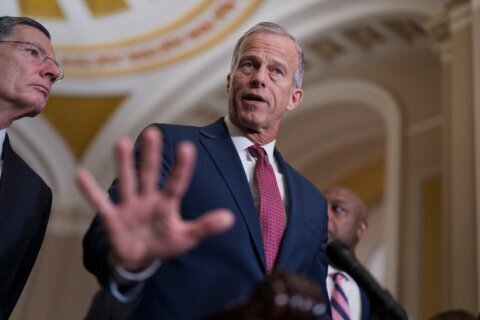It’s Thanksgiving week and Congress is not in session, but the impeachment inquiry into President Donald Trump is still moving at full speed.
In an indication that Democrats are moving quickly, House Intelligence Committee Chairman Adam Schiff wrote in a letter to House colleagues on Monday that investigators “are now preparing a report summarizing the evidence we have found this far, which will be transmitted to the Judiciary Committee soon after Congress returns from the Thanksgiving recess.”
Schiff added, “The investigative work continues, and we are learning additional information almost every day. But while we will continue with our investigative work and do not foreclose the possibility of further depositions or hearings, we will not allow the President or others to drag this out for months on end in the courts,” calling the inquiry “an urgent matter that cannot wait if we are to protect the nation’s security and the integrity of our elections.”
A handful of leadership aides and senior committee officials have planned a busy week of deliberations behind the scenes to prepare for a momentous December that will likely lead to Trump being impeached by year’s end.
That action comes on the heels of two weeks of contentious public hearings where current and former administration officials testified as part of the investigation into the Ukraine scandal. In one of the most high-profile moments, US ambassador Gordon Sondland testified that there was a quid pro quo for Ukraine to announce investigations into Trump’s political opponents that came from the President’s personal lawyer Rudy Giuliani at the “express direction of the President.”
Democrats seized on the testimony with Schiff saying that it went “right to the heart of the issue of bribery as well as other potential high crimes or misdemeanors.”
Congressional Republicans, on the other hand, have continued to push back against Democrats, arguing that the President’s actions do not rise to the level of impeachment.
GOP Rep. Will Hurd, a retiring Texas Republican who occasionally breaks from Trump, said near the conclusion of the public hearings in the House Intelligence Committee, “I have not heard evidence proving the President committed bribery or extortion.”
Here’s where the inquiry stands now and what’s next:
Investigators compile report of major findings
Democratic House aides are spending Thanksgiving week preparing a report that will spell out the case for impeachment.
The report, which will be released by the House Intelligence Committee and two other panels, is likely to be a guiding document as the impeachment proceedings move through the House Judiciary Committee. It will detail the evidence that was gathered over the course of the committee’s eight-week investigation and is expected to make recommendations about the path forward.
There are unlikely to be any big surprises in the report: Almost all of the evidence is public already, as the committees have released transcripts of 15 of their 17 depositions, the text messages they obtained from former US special envoy to Ukraine Kurt Volker and the emails provided by Sondland. It’s not clear what other documents they would have to include in the report, given the stonewalling from the Trump administration.
In a preview of what may be to come, Schiff wrote in his letter on Monday, “Over the course of our inquiry, we have uncovered a months-long effort in which President Trump again sought foreign interference in our elections for his personal and political benefit at the expense of our national interest.”
Schiff added, “Even as we draft our report, we are open to the possibility that further evidence will come to light, whether in the form of witnesses who provide testimony or documents that become available,” adding, “We will follow up on any additional evidence, even as we proceed with the preparation of our report.”
The final two transcripts from closed-door depositions also still need to be publicly released — from Philip Reeker of the State Department and Mark Sandy of the White House Office of Management and Budget.
Deliberation on articles of impeachment
Senior aides on the House Judiciary Committee and Intelligence Committee plan to continue deliberation with House Speaker Nancy Pelosi’s staff to determine the size and scope of the articles of impeachment. Ultimately, the decision will be made by Pelosi.
They are looking at multiple articles of impeachment — including abuse of power, obstruction of Congress, obstruction of justice and bribery. There is a debate underway about whether to include the episodes detailed in special counsel Robert Muller’s report within an article of obstruction of justice.
In his letter on Monday, Schiff wrote, “We will catalog the instances of non-compliance with lawful subpoenas as part of our report to the Judiciary Committee, which will allow that Committee to consider whether an article of impeachment based on obstruction of Congress is warranted along with an article or articles based on this underlying conduct or other presidential misconduct.”
Gearing up for Judiciary Committee hearings
Democratic lawmakers and aides privately say they expect hearings to begin in the Judiciary Committee the first week in December when Congress returns, in order to keep on schedule to finish impeachment before Christmas.
Hearings in the Judiciary Committee will initiate another high-profile stage in the impeachment inquiry culminating in a committee vote on impeachment articles.
Schiff wrote in his Monday letter, “Chairman Nadler and the Members and staff of the Judiciary Committee will proceed in the next phase of the impeachment inquiry. I urge all members to find guidance from our oath of office to protect and defend the Constitution.”
The exact format of the hearings is still being decided. But they are considering including a session on what the Constitution says about impeachment, a presentation of the case for impeachment from the committees and a chance for the White House legal team to make its case, according to Democratic sources. It’s unclear which witnesses may testify in such hearings.
The Judiciary Committee will then debate and vote on articles of impeachment after committee hearings, paving the way for a vote by the full House of Representatives if the committee approves the articles.







